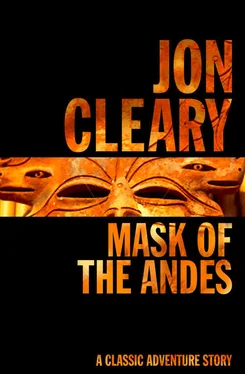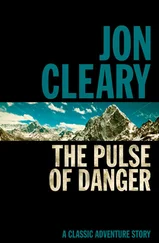Jon Cleary - Mask of the Andes
Здесь есть возможность читать онлайн «Jon Cleary - Mask of the Andes» — ознакомительный отрывок электронной книги совершенно бесплатно, а после прочтения отрывка купить полную версию. В некоторых случаях можно слушать аудио, скачать через торрент в формате fb2 и присутствует краткое содержание. Жанр: unrecognised, на английском языке. Описание произведения, (предисловие) а так же отзывы посетителей доступны на портале библиотеки ЛибКат.
- Название:Mask of the Andes
- Автор:
- Жанр:
- Год:неизвестен
- ISBN:нет данных
- Рейтинг книги:5 / 5. Голосов: 1
-
Избранное:Добавить в избранное
- Отзывы:
-
Ваша оценка:
- 100
- 1
- 2
- 3
- 4
- 5
Mask of the Andes: краткое содержание, описание и аннотация
Предлагаем к чтению аннотацию, описание, краткое содержание или предисловие (зависит от того, что написал сам автор книги «Mask of the Andes»). Если вы не нашли необходимую информацию о книге — напишите в комментариях, мы постараемся отыскать её.
Mask of the Andes — читать онлайн ознакомительный отрывок
Ниже представлен текст книги, разбитый по страницам. Система сохранения места последней прочитанной страницы, позволяет с удобством читать онлайн бесплатно книгу «Mask of the Andes», без необходимости каждый раз заново искать на чём Вы остановились. Поставьте закладку, и сможете в любой момент перейти на страницу, на которой закончили чтение.
Интервал:
Закладка:
‘Don’t you think our State Department knows what to do?’
‘Forgive the vulgarity, Miss McKenna, but your State Department, when it comes to South America, always reminds me of The Perfumed Garden. It has twenty-five positions on any given situation.’
She laughed so heartily that two of the passing old men turned back to look at her. ‘I don’t think that’s vulgar.’
‘I didn’t think you would. But I apologized, just in case.’
She stopped laughing. ‘Why did you think I wouldn’t think it was vulgar?’
‘Listening to you the other day. You were flat out trying to prove how broadminded you were.’
‘You’re vulgarly rude, you know that?’ She looked at him sideways, studying him hard for the first time; then she looked ahead again and nodded. ‘I was trying too hard. I always do that among strangers. You may not believe it, Mr Taber, but I’m basically a shy girl. The shy ones are always the ones who try too hard.’
They passed out of the shade of the colonnade, feeling the warmth of the sun as soon as they emerged, crossed the road and were moving into the small garden square in the centre of the plaza when they heard the shots.
Taber at once put his arm about Carmel, pulling her to him and looking wildly around. The shots had been close, too close for comfort. The small pack of bootblacks at the intersection of the paths through the square suddenly scattered, diving into the shrubs like so many shrieking birds; a flock of birds exploded out of the bushes, whistling frantically, and swept away out of sight. Half a dozen women who had been sitting on the ground at the foot of the statue of Simon Bolivar in the centre of the square flung themselves flat, their faces pressed into the mosaic tiles of the path. A small child came running towards the group and its mother screamed at it to get down; the child fell down, skidding along on its face, and for one awful moment Taber thought it had been hit. Then as he pushed Carmel down on to the path he saw the child crawl forward and disappear into the spreadeagled cluster of women as into a pile of dark rocks. A bullet smacked into a seat right beside Taber and Carmel, hit the ironwork and went ricocheting off with that whine that was both frightening and fascinating, Another bullet chipped a piece off the Great Liberator; Taber, looking up, saw that the statue was pockmarked with bullet holes. There were more shots, several yells, then suddenly there was a dull boom.
Taber raised his head and looked across the square. People were lying flat everywhere, even the old men in their stiff black suits: dignity was no protection against indiscriminate bullets. Smoke was flowering out of the doors and windows of the bank on the corner of the plaza; a man staggered out of the front door, his hands to his face, and collapsed in a sitting position on the pavement. Two cars, engines roaring, were pulling away from in front of the bank. Suddenly one of them stalled, but the other, tyres screeching, swung round the square, heading for the main street that ran out of town. Three men fell out of the stalled car and came running across the square; the second car had shuddered to a stop and was waiting for them. One of the Indian women at the foot of the statue sat up, her back to the advancing bank robbers. One of the men ran right into her, plunging over her and falling headlong. His pistol shot out of his hand, slid across the tiled path towards Taber like a challenge. He moved his head up and the gun slid in under him, clunking against his breastbone.
The bank robber, a thickset man in a black hood, scrambled to his feet and hurled himself at Taber. The latter rolled aside, away from Carmel, automatically snatching at the gun as he did so. The man aimed a kick at Taber’s head but missed as the Englishman continued rolling. Taber came up on one knee, the pistol raised; then he froze, the gun a heavy weight in the hand that could barely hold it. The other two bank robbers, both hooded, stood over him, their guns aimed directly at his head. He drew a deep breath, then tossed the gun at the feet of its owner. The man picked it up, growled something that was muffled by the hood; then the three men, in answer to the urgent hooting of the horn of the car waiting for them, went running across the square. As they ran one of the men snatched some leaflets from his pocket and hurled them into the air. A gust of wind caught the leaflets and some of them were still floating across the gardens as the running men jumped into the car and it went roaring off out of the plaza.
Taber stood up, crossed quickly to Carmel and helped her to her feet. She was struggling to get her breath, her pale face turning slightly blue. Taber pushed her down on to the nearby seat, took a tablet from a tin in his pocket and forced it between her lips. ‘Take this, it’ll slow down your pulse. I’ll try and get you some oxygen. There’s a hotel over there – they’d have a cylinder—’
She clutched his arm, shook her head. ‘Don’t – leave – me!’
He looked around. The old men were getting painfully and awkwardly to their feet, dusting themselves off and looking bewilderedly around as if searching for lost dignity: the Indian women were moving in a tight group across to join the growing crowd outside the bank. Three policemen, each blowing his whistle in a loud cheep of authority, came running from different directions; a truck, horn blowing, came lurching round the plaza, pulled up in front of the bank and disgorged a dozen soldiers. People were appearing from everywhere, but now, with the arrival of the soldiers, the small crowd outside the bank began to disintegrate. The group of Indian women suddenly about-turned and trotted back to sit once more at the foot of the statue of the Liberator. The old men stood in their own group across at the bank; an image sprang into Taber’s mind of photos he had seen of delegates to international conferences in the thirties, formally dressed old men with tight worried faces who saw the coming of the end of their world. The high school students had come out of the café, chattering among themselves but, unlike teenagers Taber had seen elsewhere, minding their own business and making no attempt to move down towards the bank. People, criollos and Indians, lined the edges of the plaza or stayed stiffly where they were in the gardens; but no one made a move towards the bank now that the soldiers had arrived. The clerk who had staggered out of the bank still sat on the pavement, swaying back and forth, holding his face; against the wall of the bank Taber saw for the first time the crumpled body of a policeman. A car, siren wailing, came into the plaza and juddered to a sharp stop behind the military truck. Three officers got out and hurried into the bank.
Taber helped Carmel to her feet, putting his arm round her. Something blew against his feet; it was one of the leaflets tossed away by the bank robbers. He picked it up, held it crushed in his hand as he began to help the still gasping Carmel across the square.
‘My hotel’s not far from here. They’ll have an oxygen cylinder.’
They walked slowly, she leaning on him like an old woman. People watched them curiously, but no one stepped forward to ask if they could help. Carmel was still fighting for her breath, but Taber, his arm round her, could feel the gasping slowly subsiding.
It was perhaps three hundred yards to Taber’s hotel but it took them almost ten minutes to reach it. It was a ten-year-old concrete building that looked uncomfortably out of place among its old stone, tile-roofed neighbours; even its name, the Dorchester, was a brash piece of bravado that had not quite come off: the two middle letters of the neon sign did not work. It was owned and run by a Bulgarian and his wife and was, Pereira had assured Taber, absolutely the best hostelry in town.
Читать дальшеИнтервал:
Закладка:
Похожие книги на «Mask of the Andes»
Представляем Вашему вниманию похожие книги на «Mask of the Andes» списком для выбора. Мы отобрали схожую по названию и смыслу литературу в надежде предоставить читателям больше вариантов отыскать новые, интересные, ещё непрочитанные произведения.
Обсуждение, отзывы о книге «Mask of the Andes» и просто собственные мнения читателей. Оставьте ваши комментарии, напишите, что Вы думаете о произведении, его смысле или главных героях. Укажите что конкретно понравилось, а что нет, и почему Вы так считаете.












